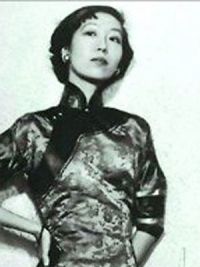Eileen Chang
Eileen Chang (张爱玲) is one of the noted Chinese writers of the 20th century. Her novels mostly focus on the love and tension between men and women. Her sharp observations on the bourgeois life in Shanghai and Hong Kong made her works popular among urban readers.
Her most notable novels include “Lust, Caution,” which was adapted by Ang Lee into a film of the same name in 2007, and “Love in a Fallen City.”
Born Sept. 30, 1920, Chang was a grandchild of Li Hongzhang, an important diplomat during the late Qing Dynasty (1644-1911). But even with a prominent family background, Chang had a miserable childhood. After her parents divorced when she was young, she lived with her father but was mistreated by him and her stepmother. At 18, she ran away to live with her mother, who gave her two choices: to get married or to continue her studies. Chang chose the latter.
Chang began her education when she was 4, learning to speak Chinese and English. She graduated fromSt. Maria Girls’ School in 1937 and received a full scholarship to the University of London two years later. But she never used it, attending instead the University of Hong Kong to study literature. She never would receive a degree though: Hong Kong fell to the Japanese in 1941 during the Anti-Japanese Aggression War (1937-1945).
Chang returned to Shanghai and began writing novels and essays for magazines. Her early works include “My Dream of Genius,” “My Life” and “The Fragment of Agalloch Eaglewood.” The following three or four years saw her stories in many journals, including "Heaven and Earth", "Golden Cangue" and "Manifestations of Nature".
In 1943, Chang met Hu Lancheng, a traitor who worked for the Japanese during the World War II. They married a year later. Hu fled Shanghai after Japan was defeated and married Fan Xiumei in neighboring Wenzhou. Chang divorced him in 1947.
Unaccustomed to the life after liberation, Chang moved to Hong Kong in 1952. Three years later, she moved to the U.S. where she met her second husband, American screenwriter Ferdinand Reyher. They married in 1956, and Chang had a miscarriage.
Reyher eventually became paralyzed after a series of strokes and died Oct. 8, 1967. Chang lived the rest of her life in seclusion. She was found dead in her apartment on Sept. 8, 1995. According to her death certificate, she died from cardiovascular disease.
